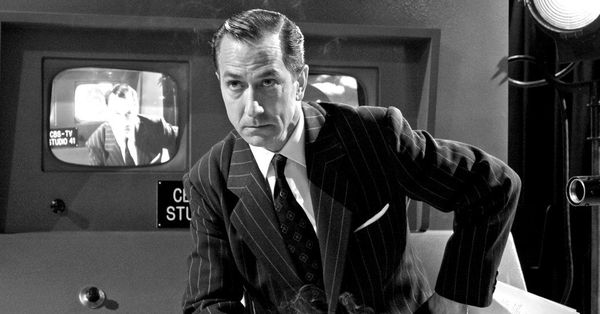Eye For Film >> Movies >> Good Night, And Good Luck (2005) Film Review

Cinema can be entertainment; it can be art; it can be a popular voice. It can be eye-candy, or sometimes it can be a force for good. Hollywood has long been primarily regarded (sometimes unfairly) as entertainment only. Many European countries no longer even enter their best work for Academy Awards - only the best crowd pleasers of the crop. A few indies have stood out, but works of significant art, or important social comment, have been largely seen as uncommercial.
A group of leading filmmakers set out to challenge that commonly accepted notion with a company called Participant Productions. Their hypothesis was quite simple: there is a mainstream audience for well-made films that have the power to inspire on important issues. "Participant believes in the power of media to create great social change. Our goal is to deliver compelling entertainment that will inspire audiences to get involved in the issues that affect us all."

Good Night, And Good Luck is one of their first three major films, the others being North Country (sexual harassment) and Syriana (human consequences of the pursuit for oil). At the time of writing (February, 2006), all three have been critical and commercial successes and Participant Films has garnered 11 Academy Nominations.
Good Night, And Good Luck is about the struggle to protect democratic freedoms. It came on general release in the UK the day after the United Nations called for the closure of Guantanamo Bay, a centre where people are detained without due process of law and for lengthy periods, merely on suspicion of involvement with terrorism. It went on general release on the same day that Channel 4 Television aired a programme by Walter Wolfgang, the lifelong Labour Party activist ejected from last year's Labour Party Conference for speaking out against the Foreign Secretary on Iraq - a programme showing how the British Government has gradually reduced dissent within its own ranks and that new legislation designed to prevent terrorism is being used by the police in ways that are effectively eroding our civil liberties. Footage included peaceful protestors who had been stopped under the Terrorism Act, including an elderly man held in Brighton for wearing an anti-Blair T-shirt and an 11-year-old girl stopped and searched while participating in a peace march.
Good Night, And Good Luck is set in the McCarthy era of US history, one of the blackest periods for American civil liberties, when the mere hint that a person sympathised with communism was enough to lose them their job. No evidence was needed. The Junior Senator, Joseph McCarthy, used the nation's fear of the communists, who were making real and frightening advances in Korea, Eastern Europe and China, to round up people with the hysteria of a witch-hunt.
Disagreeing with McCarthy was tantamount to being a "dangerous communist" and could mean blacklisting for oneself and one's family, or even imprisonment without proper trial, under the vaguely worded Alien Registration Act, which made it illegal for anyone to advocate, abet, or teach the desirability of overthrowing the government. Membership, or past membership, of the Communist Party was sufficient, but if there were no public evidence, then secret information was cited. It took a long time for people to speak out.
Broadcaster Edward Murrow (and his producer Fred Friendly) was one of those who lead the charge, using private money when CBS and the television sponsors refused to finance their programme. Public response was overwhelming. By 15 to 1, people supported Morrow's attack on McCarthy. Emboldened, televised Senate investigations led to McCarthy's downfall, even as he attacked Morrow.
In George Clooney's second outing in the director's chair, he has scored a palpable hit of a movie and also struck a blow for integrity in filmmaking, both in content and style. Parallels between the McCarthy indictment-without-evidence and the US detention-without-trial at Guantanamo Bay (or the UK's powers-of-detention under the Terrorism Act) are exceedingly (and intentionally) plain. If we sacrifice the freedoms that are the bedrock of what we claim to be protecting, whether it be from communism or terrorism, then the struggle ceases to lose much of its meaning.
What makes Good Night, And Good Luck so powerful, however, is that it leaves the audience to make the connection itself, by the careful telling of history, rather than the dubious rantings of left wing softies. The evils of McCarthyism are no longer disputed. Nor was Morrow's patriotism ever in doubt. He had a magnificent track record of upholding the liberties of which America is so proud, so the film stands first and foremost as a patriotic clarion call for freedom. Morrow claimed that Americans were not only able to be strong militarily, but they were able to be strong in robust debate. This movie, 50 years later, is a tribute to that robust debate.
Stylistically, the use of black-and-white reminds us of the magic of that medium, especially on modern high quality 35mm film. The Fifties are lovingly recreated, from the deep jazz soundtrack with Dianne Reeves and Rosemary Clooney's band, the hand-written prompts for announcers in TV's early days, to the ubiquitous cigarette smoke and a male-dominated business world. The mannerisms, haircuts, dress and even the way the film is edited, all persuade us that we are watching something made closer to that era and miraculously brought to us with digital sound and wide aspect ratio. Admittedly, the shots of McCarthy and the Senate are of noticeably poorer quality (and with poorer make-up), but the real and symbolic importance of using original footage outweighs the slight visual inconsistency.
Clooney has not only directed admirably, but has excelled himself in co-writing a taut script, as well as delivering an excellent performance as Fred Friendly, while David Strathairn establishes himself as an actor of major strength. The indelible picture of Morrow he projects is one of towering humanity, moral probity, belief in self and a courageous judgement free of bias, an icon for any reporter to hold high.
In the US today, we see vigorous debate replaced by religious conviction, or secret knowledge, and suitable apologies made when evidence such as that on WMD turned out to be "wrong." In the UK, rigorously scrutinised laws and vigorous debate within Cabinet and political parties have been replaced by showers of hasty legislation and an authoritarian Labour Party that discourages dissent within its own ranks, accused of controlling public disquiet by media spin. The safeguards in the political systems of both countries have failed. In Washington, a president is elected on a dubious vote and in the UK an opposition party's best chance of winning is by imitating the tactics of those in power. It was against such moral vacuity that the broadcast media defeated McCarthy and returned common sense and democracy to America.
Films such as Good Night, And Good Luck can be seen as a small step in a similar direction.
Reviewed on: 20 Feb 2006



















